As kids, our parents often make choices on our behalf, from the clothes we wear to our eating habits. And while moms and dads typically aim to do what’s best for us, clashes can arise when their opinions differ. For example, a mother might prioritize healthy eating, while a father lets the kids enjoy ice cream at night. These differing perspectives can create confusion for children, leaving them caught between two parenting styles.
A recent example of this dynamic unfolded when a mom clashed with her ex-husband over sending their teenage daughter to a soccer camp. Concerned about their daughter’s weight gain, which began after the divorce and custody split, she saw the camp as a way to encourage healthier habits. Her ex, however, labeled it a “fat camp,” sparking a heated argument over parenting choices. Keep reading to find out how this disagreement unfolded and what each parent had to say.
Don’t forget to check out our interview with health expert Diksha Wadhwani, who shares valuable insights on child obesity and its impact on children’s health.
Divorces can be challenging and often leave a lasting emotional impact on children

Image credits: Curated Lifestyle (not the actual photo)
A woman expressed her concern about her daughter’s weight gain, which started after the divorce and custody split, but her ex-husband did not see eye to eye with her on this issue
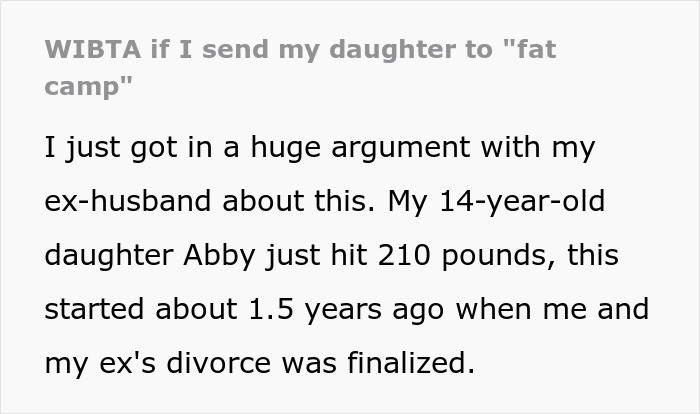

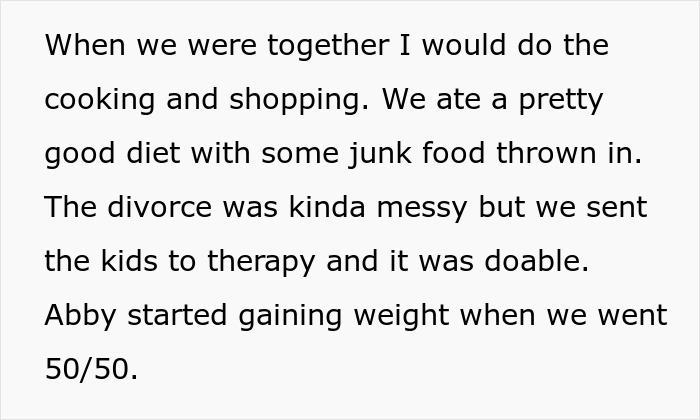
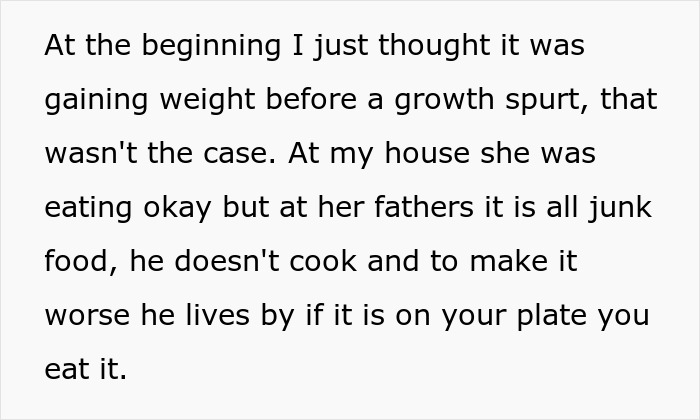
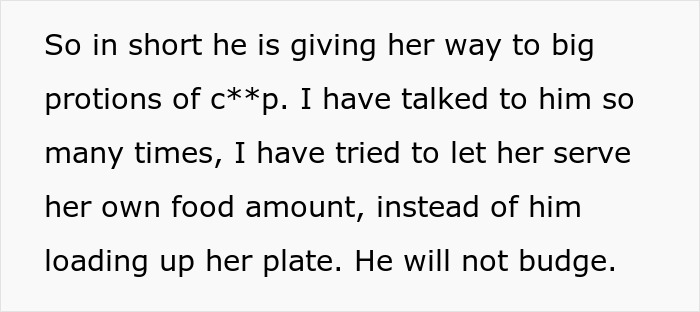
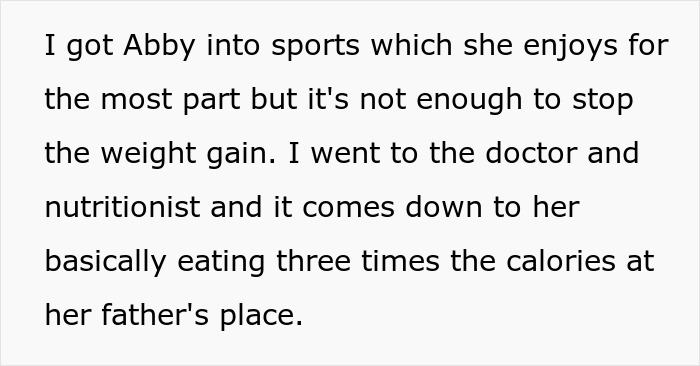



Image credits: Pamela Buenrostro (not the actual photo)

Image credits: Few-Fig1415
The woman shared additional details about the camp, including how she plans to schedule it legally
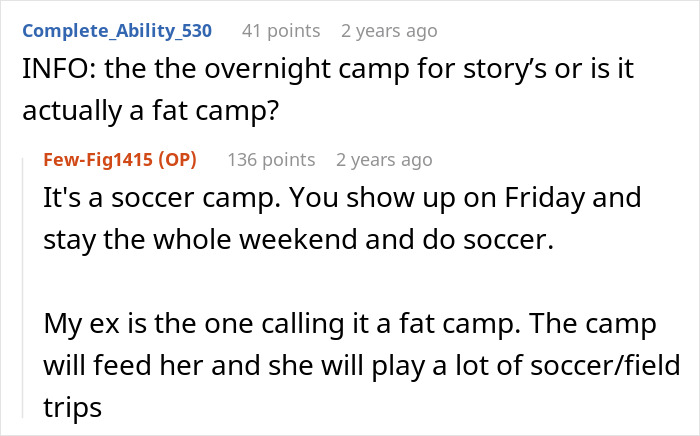
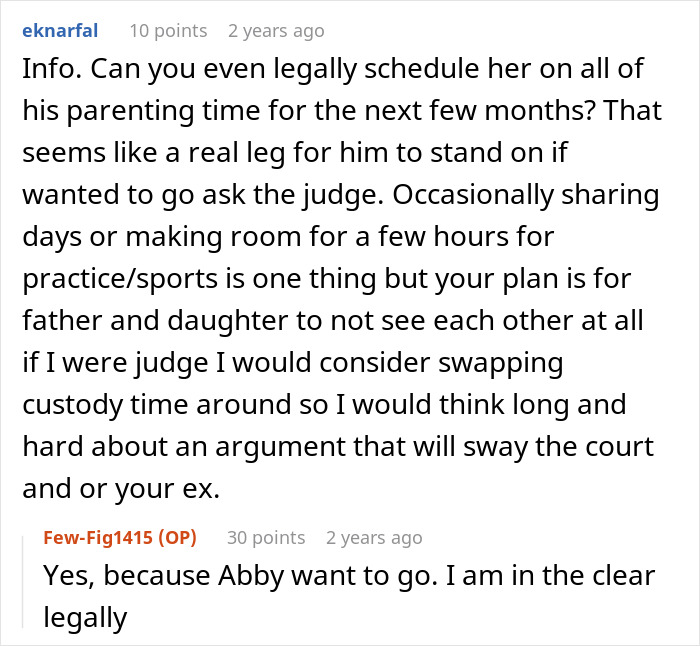
Childhood obesity often persists into adulthood, increasing the risk of chronic health conditions, and obesity-related complications later in life

Image credits: Getty Images (not the actual photo)
In recent years, childhood obesity has become a significant concern. According to the World Health Organization, over 390 million children and adolescents aged 5–19 were classified as overweight in 2022.
To gain insights into this issue, we spoke with Diksha Wadhwani, a certified nutritionist. She noted that the rise in childhood obesity can be attributed to several lifestyle changes, with screen time playing a significant role. “Many young children are frequently exposed to cartoons as a way to keep them occupied while parents attend to their responsibilities,” she explained. This early exposure can lead to addictive behavior, as these shows are designed to stimulate the dopamine reward system in the brain, similar to the effects of sugar and drugs.
Wadhwani pointed out that as a result, children are spending less time outdoors. “When I was a child, we had just one hour of television in the evening. Outside of that, we were expected to entertain ourselves, which usually meant gathering with friends to play. This naturally encouraged physical activity.”
Additionally, the busy lives of working parents have led to a greater reliance on convenience foods. “Unfortunately, most ready-to-eat or ready-to-cook meals tend to be high in calories but low in nutrients,” she noted. This reliance often leaves families with little time to prepare fresh, home-cooked meals that provide the essential nourishment both children and parents need.
Wadhwani, who has over 79,000 followers on Instagram, explained how the rise in junk food consumption is impacting children’s health. “Junk food, which is often high in sugar, unhealthy fats, and salt, can have serious consequences for children’s well-being,” she stated.
Regularly consuming these types of foods can lead to weight gain and insulin resistance, significantly increasing the risk of chronic conditions such as type 2 diabetes, heart disease, and even certain cancers.
Parents play a crucial role in ensuring their children receive proper nutrition by encouraging a balanced, healthy diet that supports growth, development, and overall well-being

Image credits: Curated Lifestyle (not the actual photo)
Moreover, the excessive sugar and fat content can negatively affect a child’s brain function and mood, resulting in energy crashes. This can also contribute to mental health challenges like anxiety and depression. The implications of poor dietary choices can extend far beyond physical health, highlighting the need for greater awareness and healthier eating habits among families.
As an integrative health coach, Wadhwani elaborated on how parents can encourage healthier eating habits in their children. “The most effective way for parents to foster better eating habits is to lead by example. Children are quick to adopt behaviors they observe, rather than those they are simply told about. For instance, if a parent is rushing out the door and skips breakfast while telling their kids to sit down and eat, the kids are likely to push back against this contradiction.
To cultivate healthier eating habits, start by incorporating more whole foods into your family’s diet—think fruits, vegetables, lentils, legumes, whole grains, eggs, poultry, and fish. Establish a regular mealtime routine by aiming to eat at the same times each day. Cooking at home is also key; even if your child craves something indulgent, prepare it together to make it a fun activity.
Practicing mindfulness around meals is essential as well. If your child feels full, respect their hunger cues and avoid force-feeding. Finally, refrain from labeling foods as ‘good’ or ‘bad,’ as this can create an unhealthy relationship with food, leading to binging on ‘bad’ foods during moments of stress or anxiety.”
She concluded by emphasizing that it’s crucial for kids to be active, as regular physical activity not only supports their physical health but also enhances their mental well-being, boosts their mood, and helps them develop essential social skills through play and teamwork.
In this particular case, it seemed like the father was setting a poor example by allowing his daughter to consume too much junk food. Do you think the mother was justified in seeking healthier options for her daughter? How important do you believe it is for parents to maintain consistent dietary habits when co-parenting?
Many people online supported the author, stating that the father should take more responsibility in caring for their daughter
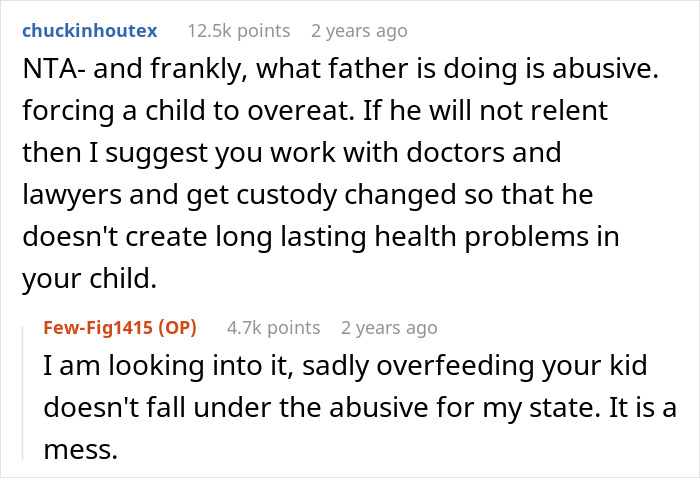
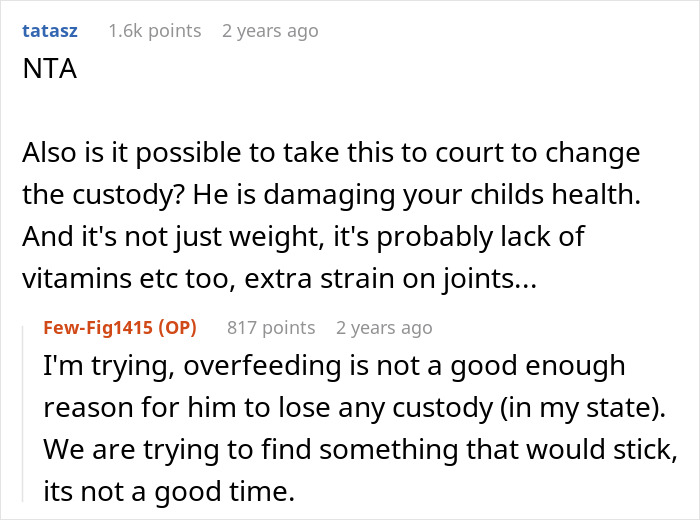

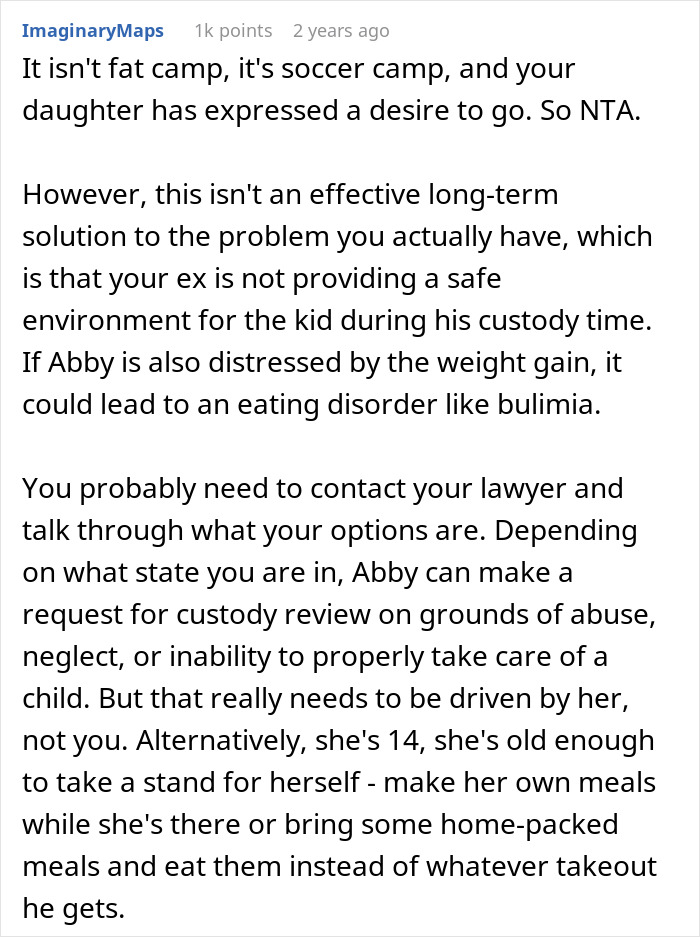
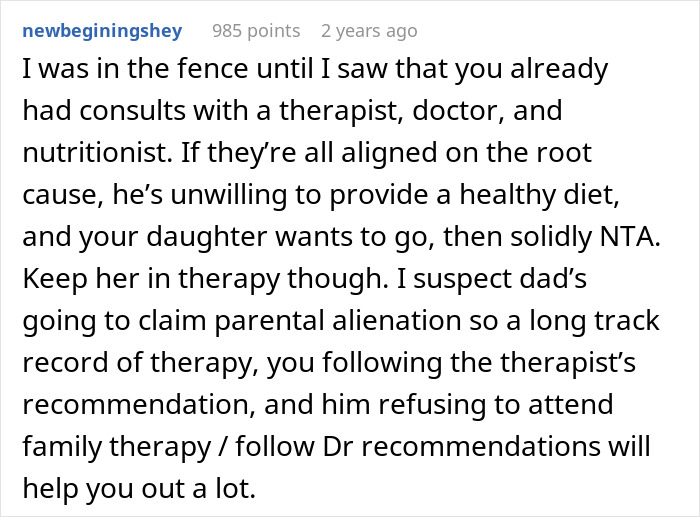
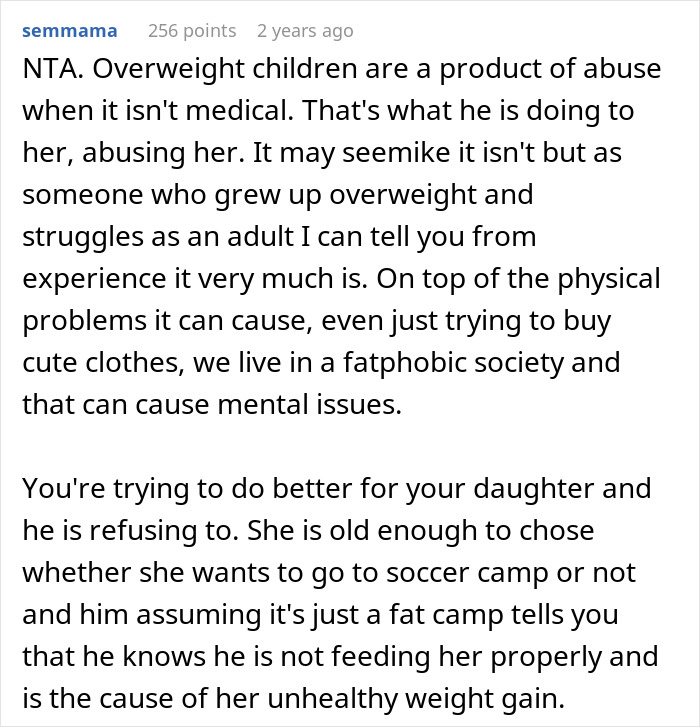
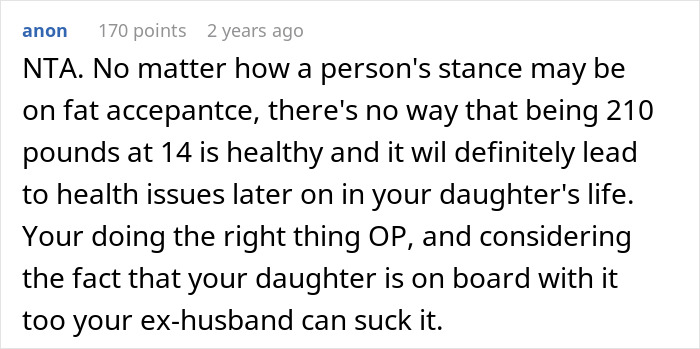
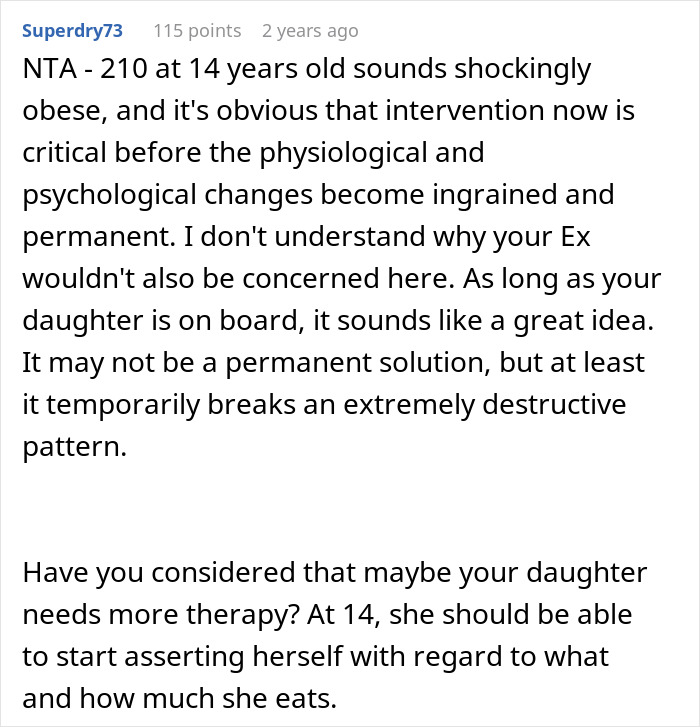



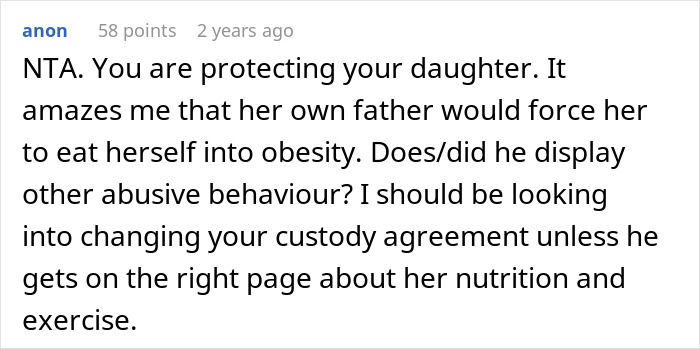
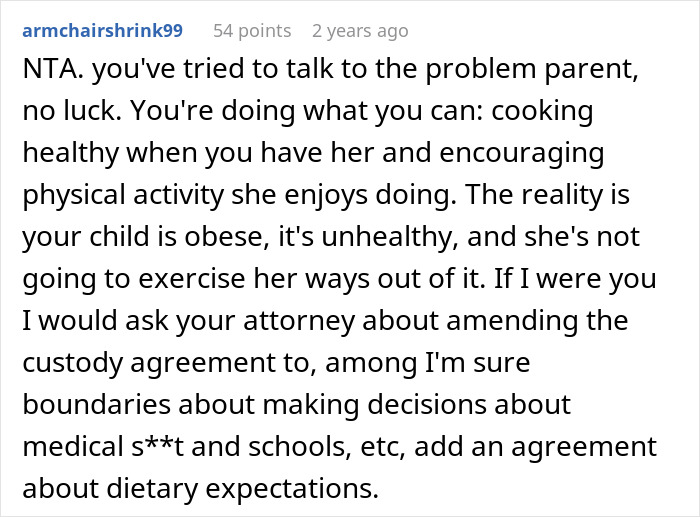
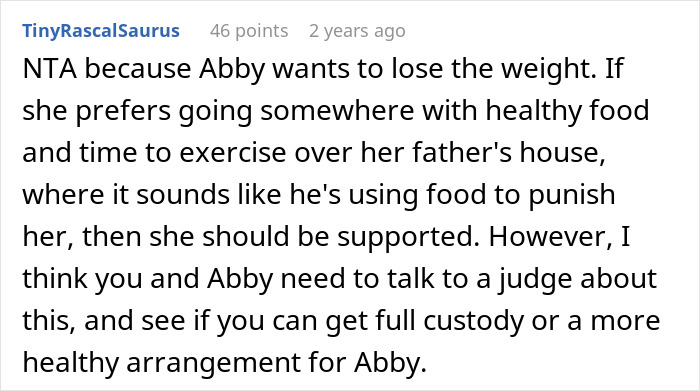
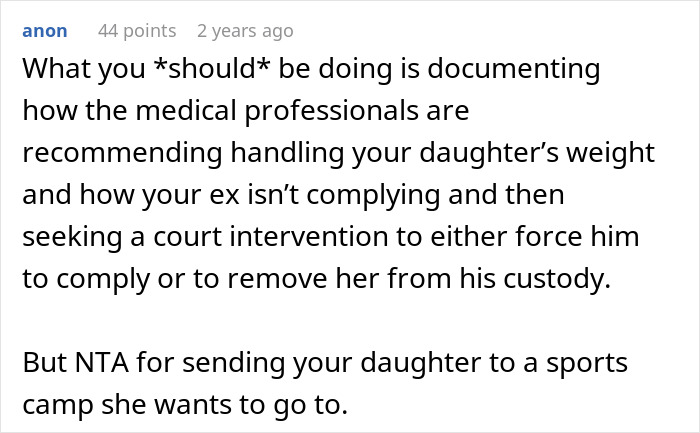
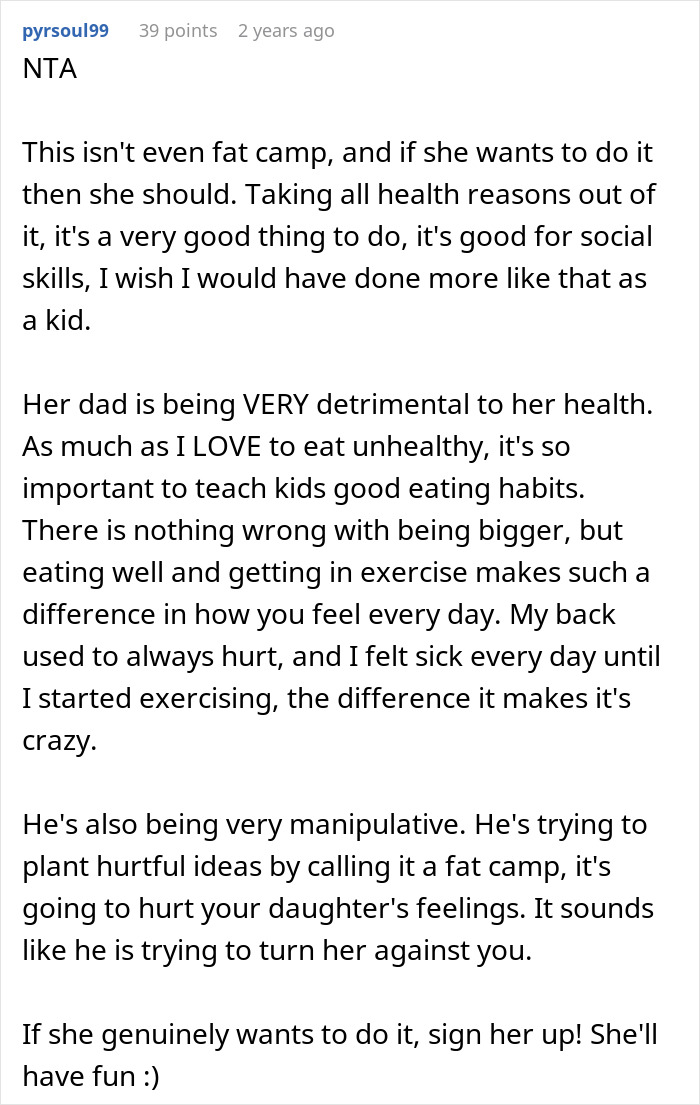

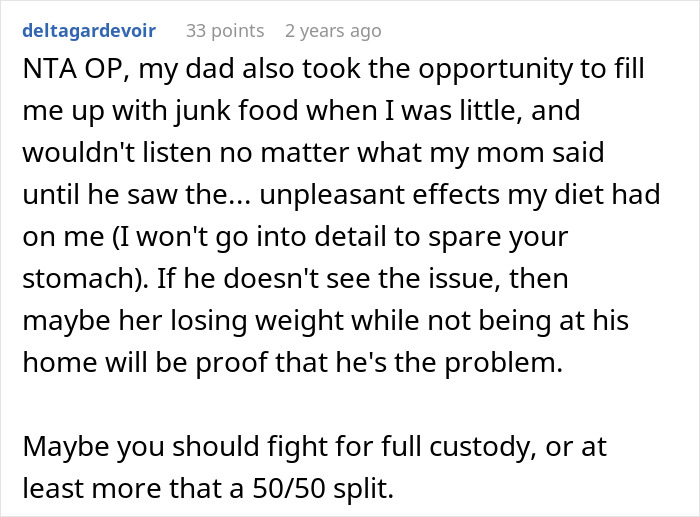



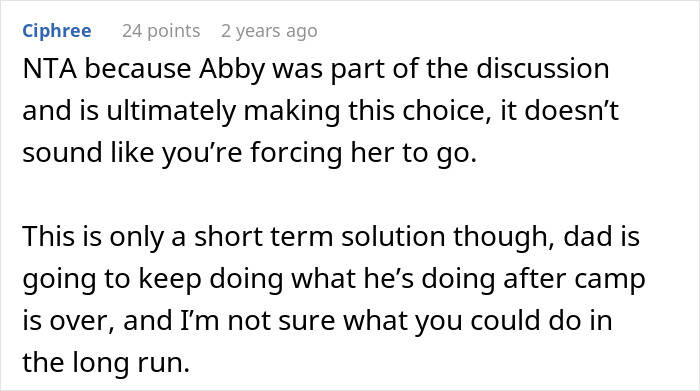

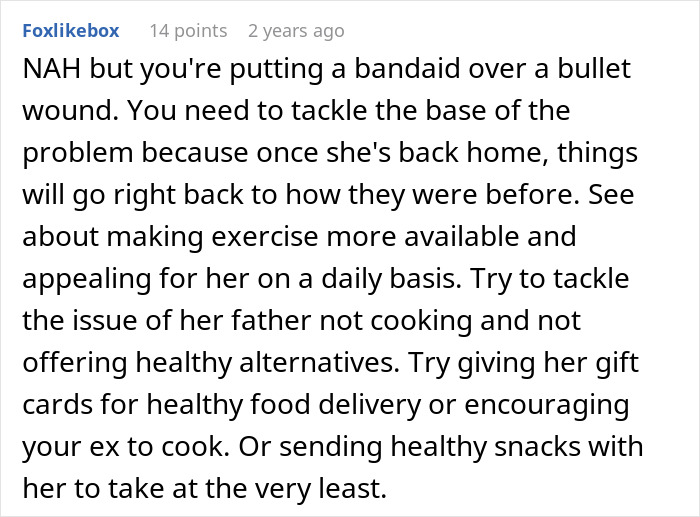
Others believed that both the author and her ex-husband shared equal responsibility for the situation
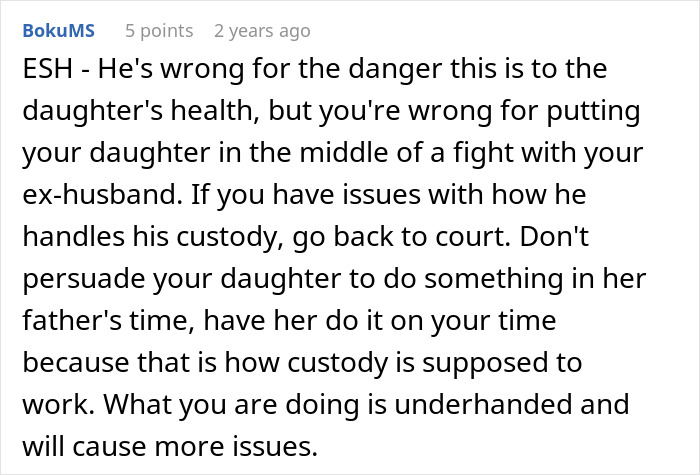
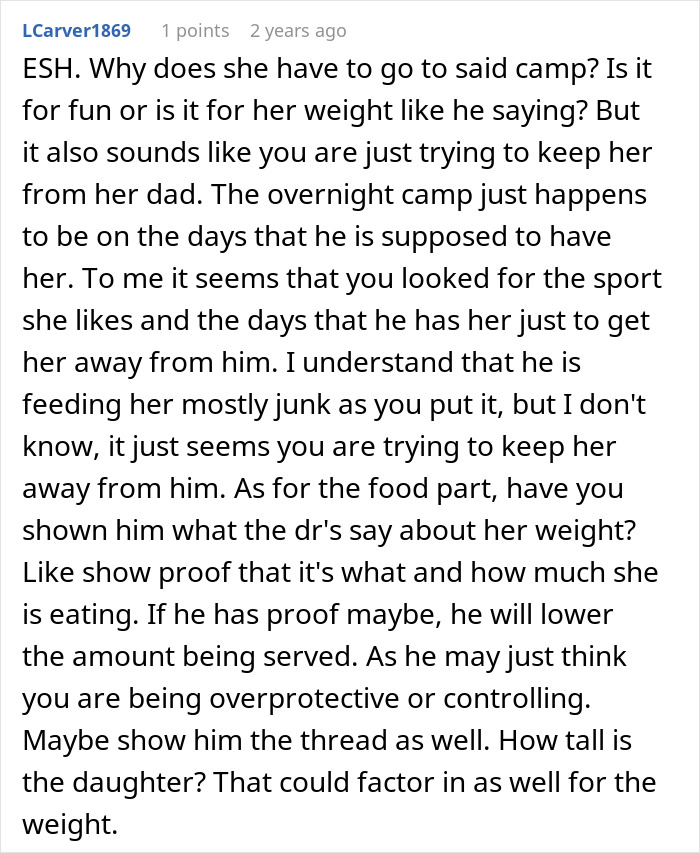
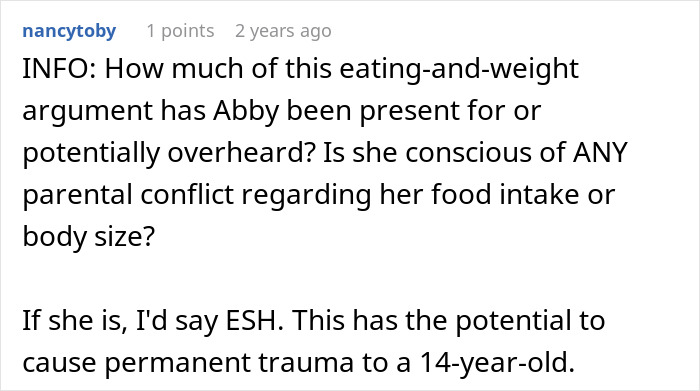
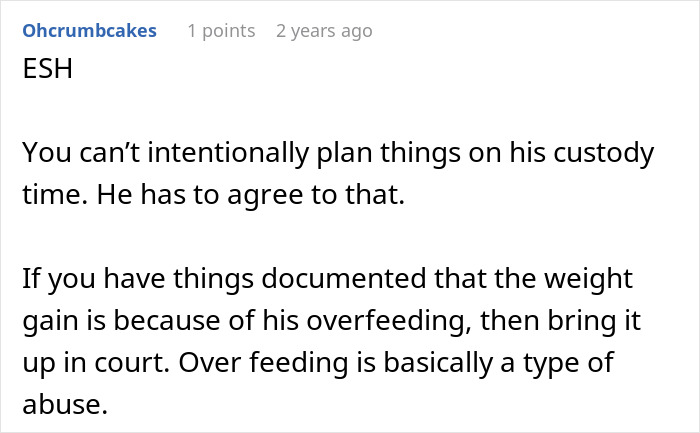
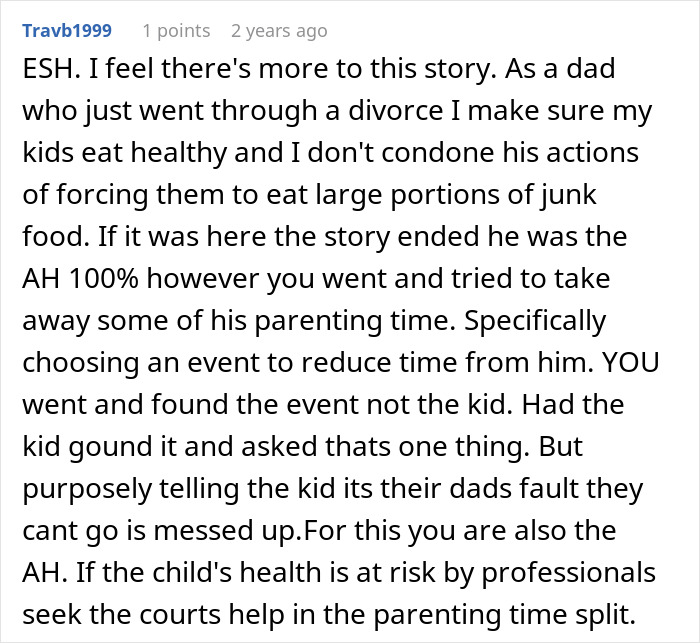
Some felt that the author had no right to interfere with the father-daughter custody time
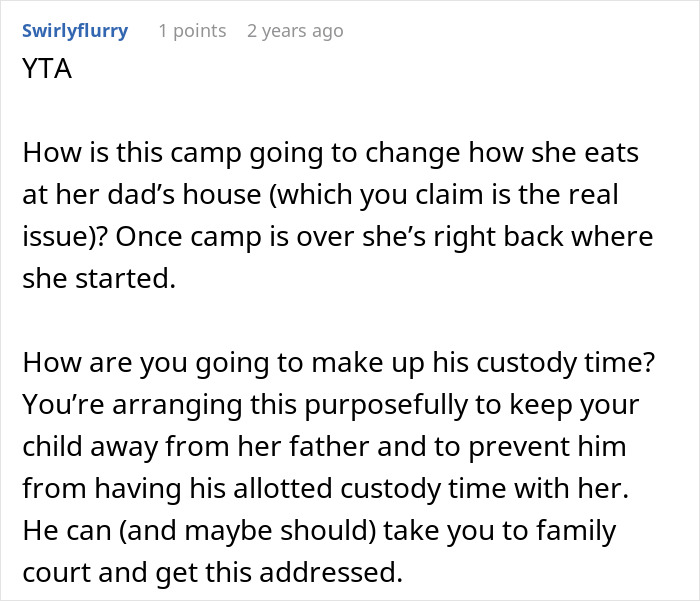

Someone also pointed out that the author’s ex might be dealing with food-related trauma
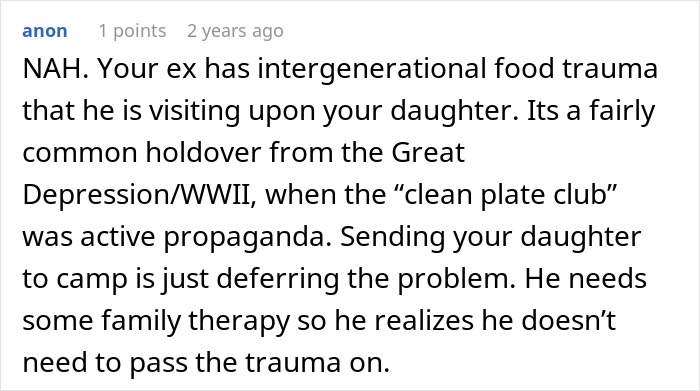

A few others shared similar experiences, emphasizing how such situations negatively affected their children

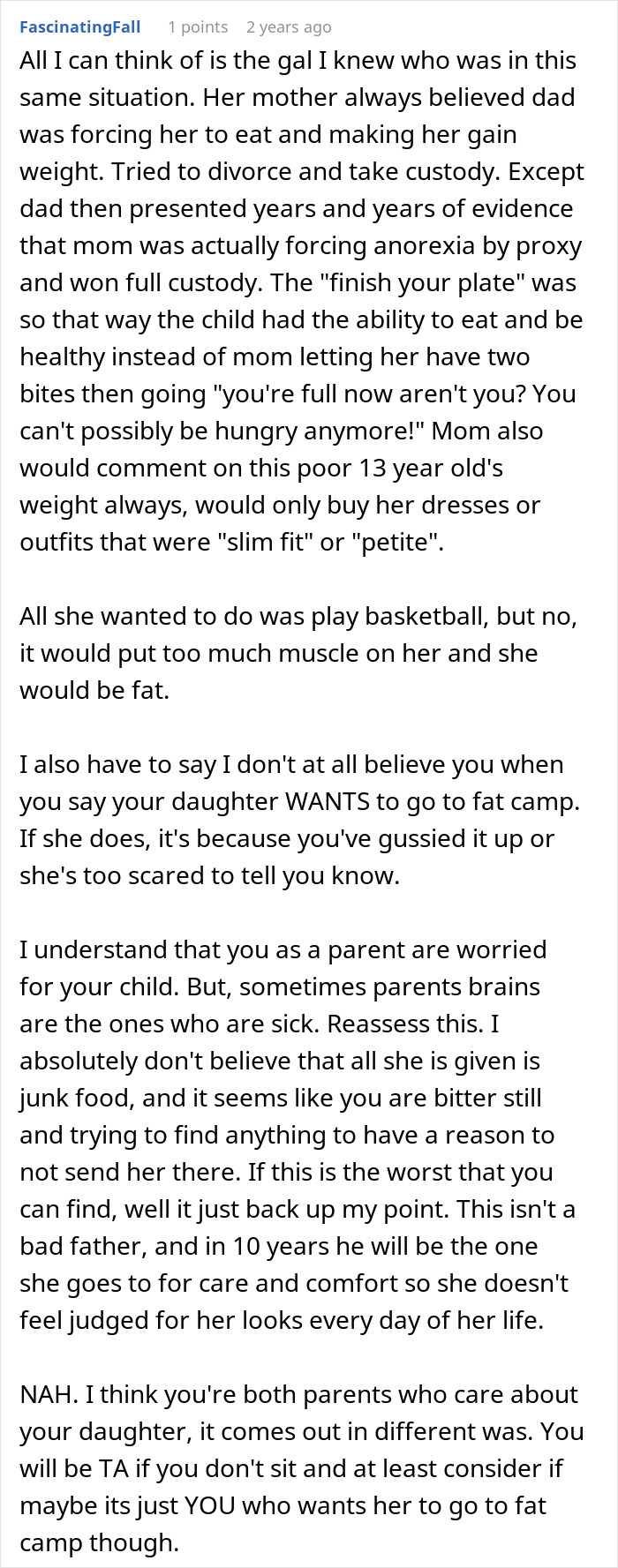

The post Ex-Husband Feeds Daughter Junk Food, Is Fuming Wife Wants To Send Her To “Fat Camp” first appeared on Bored Panda.
from Bored Panda https://ift.tt/l9bCHQG
via IFTTT source site : boredpanda